How Much Protein Do You Need?
How much protein do you need? There are plenty of myths and misconceptions when it comes to this nutrient. Here are the facts and why you need to know them.
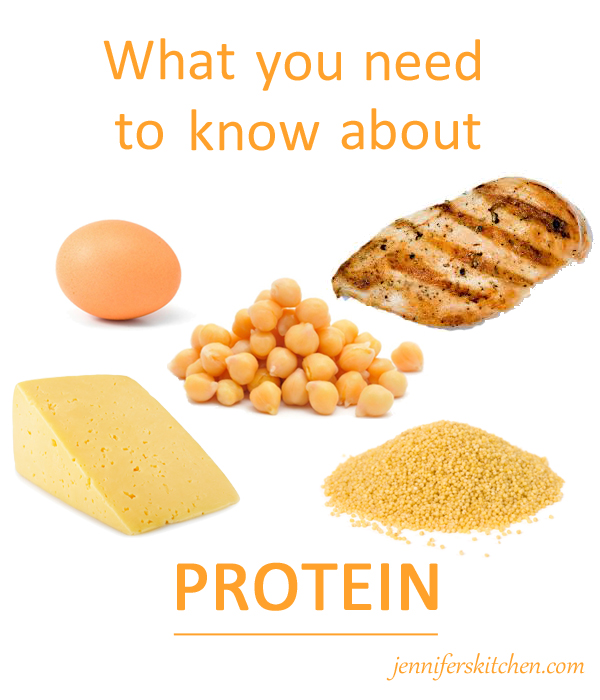
There are plenty of myths and misconceptions when it comes to dietary protein.…
How much protein do I need?
Is it possible to eat too much of this nutrient?
Can vegans get enough?
Does a vegan or a vegetarian need to combine proteins?
What are the best sources of protein?
How much extra protein do I need if I work out?
First, let’s look at …
How much protein do I need?
1. The Recommended Daily Allowance (RDA) for protein is 0.36 grams per pound of ideal body weight. (If you are overweight, you should use your ideal weight for calculations.) This works out to be about 10% of the total calorie intake.
Many experts believe this figure to be influenced politically and not based on sound research, and reports from peer-reviewed literature suggest the need is much lower. In fact, some studies have shown that any amounts over 30 grams daily gets expelled from the body.
The World Health Organization recommends much less.
At the very least, the RDA value has a large margin of safety, and the body’s true need is much lower for most people.
For the sake of argument let’s assume we do indeed need as much as 0.36 grams of protein per pound of ideal body weight. What does this mean to you?
Doing the Math
How many grams of protein should you eat if you need 0.36 grams of this nutrient per pound of ideal body weight?
1. First you need to determine your healthy body weight. How do you determine your ideal body weight? (Ideal body weight will vary from person to person. This is just a general guide.)
If you are a woman, start with 108 pounds for the first 5 feet of your height. Then add 3.75 pounds for each additional inch.
If you are a man, start with 115 pounds for the first 5 feet. Then add 4.2 pounds for each additional inch.
The average American female is about 5 feet 4 inches tall, so her ideal body weight for that height is 123 pounds.
The average height of an American male is 5 feet 10 inches. The ideal body weight for that height is 157 pounds.
2. Next multiply your ideal weight by 0.36 to get the grams of protein you should eat daily.
So, if you are a 5′ 4″ female, your ideal body weight is about 123 pounds, and you will need 44 grams protein daily.
If you are a 5′ 10″ male, your ideal body weight is about 157 pounds, and you will need 56.5 grams protein daily.
Is it difficult to get this much protein? Well, let’s take a look …
How much protein does the average person eat?
The National Health and Nutrition Examination Survey found that the average American female about 70 grams of protein daily. This is 26 grams more than the recommendation that many researchers feel is already too high.
The same survey found the average American male consumes about 102 grams of this nutrient per day. This is almost twice as much as the RDA.
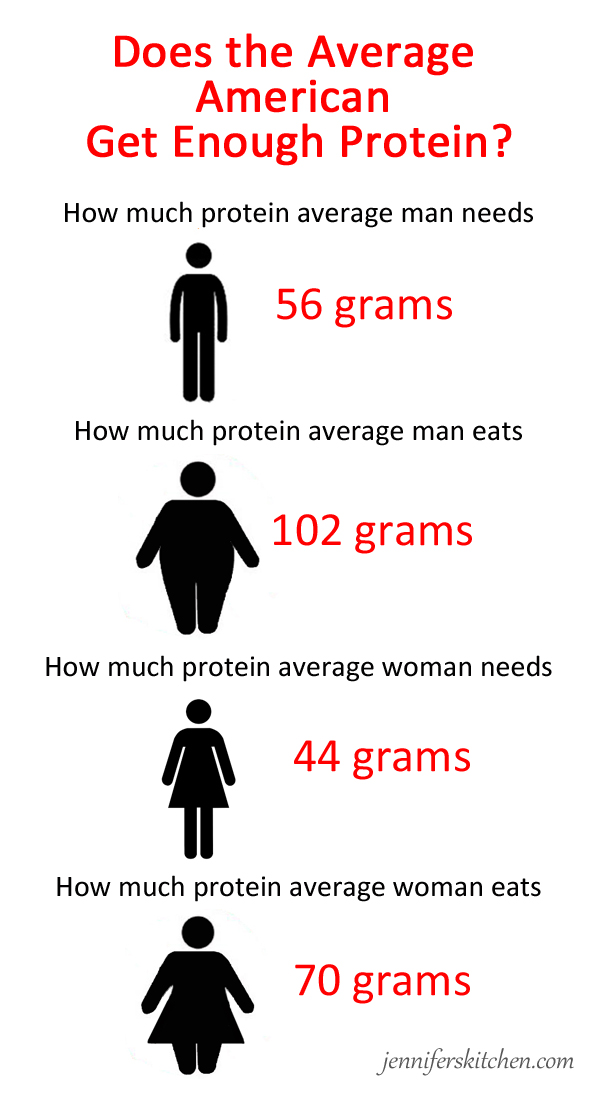
Is it okay to eat more protein than your body needs?
If a little is good, more is better, right?
Not with protein. Once you’ve met your needs, it is a burden to the body to dispose of the extra.
And since your body can process only so much protein at a time, anything extra may simply be extra calories, which may be stored as fat.
Are there health risks from eating too much protein?
Here are just a few of the damaging effects of excess protein consumption:
Bone loss and osteoporosis
High dietary protein intake encourages urinary calcium loss.
Many foods that are high in this nutrient are also high in sulfur-containing amino acids, which means they are highly acidic. This acid must be neutralized by the body. To neutralize the acids, minerals are released from the bones and into the bloodstream and then filtered through the kidneys into the urine.
Statistics reveal that rates of hip fractures increase with increasing animal protein consumption. For example, people from the USA, Canada, Norway, Sweden, Australia, and New Zealand are the largest consumers of protein and they also have the highest rates of osteoporosis. The lowest rates osteoporosis are among people groups who eat low-protein diets. (Ironically these people also consume very little calcium.)
Studies show that for every 10 grams of dietary protein in excess of 30 grams daily, the daily urinary calcium loss is increased by 16 mg.
Kidney stones
Once released from the bones, the bone minerals move through the blood stream to the kidneys where they are eliminated in the urine. When this bone material arrives in the collecting systems of the kidney it precipitates into solid formations known as kidney stones.
Over 90% of kidney stones (in the U.S.) are formed primarily of bone-derived calcium.
Researchers have found when people added about 5 ounces of fish (about 34 grams of this nutrient) to a normal diet, the risk of forming urinary tract stones increased by as much as 250 percent.
Gallstones
Many studies show that high-protein diets nearly double the risk of gallstones in women as compared to plant-based diets.
Mood swings and poor cognitive function
When we reduce healthy carbohydrates (which is inevitable when we increase protein intake), we reduce the primary fuel source for our brain and nervous system. In addition, a high-protein diet reduces serotonin levels – which can cause irritability and brain fog.
In one study, women on a high-protein diet scored significantly lower on memory-based tasks compared with women who ate a diet lower in this nutrient. When the high-protein group reduced their protein intake, their cognitive skills improved.
Bowel disorders
Since eating too much protein can displace healthy carbohydrates in the diet and fiber is a carbohydrate, too much protein can equate not enough fiber. Insufficient fiber often causes bowel disorders.
Accelerated Aging
Too much of this nutrient causes our bodies to age faster.
Heart Disease
High levels of homocysteine is a by-product of protein metabolism and an independent risk factor for heart disease.
Kidney Disease
Excess protein places a strain on the kidneys as they have to expel the extra nitrogen and other waste products of excess protein through urine.
Liver Stress
When you eat protein, your body produces ammonia, a toxin that your liver must process. Eating too much protein over a long period of time overworks your liver.
High Cortisol Levels
The acidic condition created by a diet of too much protein raises cortisol levels. Elevated cortisol causes chronic bone loss – just like giving steroid medication for arthritis causes osteoporosis.
Cancer
One study found that eating a high-protein diet during middle age increases the risk of dying from cancer by more than four times, compared to eating a low-protein diet.
Gout
Foods high in protein increase levels of uric acid in the blood thus increasing risk of gout.
Insulin resistance and diabetes
When the body senses a lack of dietary glucose, peripheral insulin resistance is triggered. This prevents the muscles from taking up precious glucose that the brain requires.
In addition, an overload of amino acids has been shown to cause changes at the cellular level that can lead to insulin resistance.
One study found that those on a high-protein diet had a 5-fold increase risk of death related to diabetes.
A recent randomized clinical trial showed that a low-fat diet that was high in healthy carbohydrates outperformed the American Diabetes Association’s standard dietary recommendations for people with type 2 diabetes. The subjects assigned to the high-carbohydrate diet lost more weight, had better laboratory values (including lower HbA1c and LDL cholesterol), and were more likely to be able to discontinue taking at least one of their prescription medications.
Another study reported in the American Journal of Clinical Nutrition showed that when fed in equal amounts (in calories), beef raises insulin more than whole grain pasta, cheese more than white pasta, and fish more than oatmeal.
Another study reported in the American Journal of Cardiology showed that insulin levels in type 2 diabetics and people with insulin resistance were reduced by one-third after three weeks by placing the subjects on healthy carbohydrate-, plant-based diets. This study also showed a significant reduction in blood pressure (6/8 mm Hg), triglycerides (26%), cholesterol (22%) and weight (body mass index — 4%).
Overall poor health and early death
Research that tracked thousands of middle-age adults for 20 years found that those on a high protein diet are 74% more likely to die of any cause within the study period than their low-protein counterparts.
Can vegans and those on a plant-based diet get enough protein?
Vegetables, grains, legumes, and nuts and seeds contain all the essential amino acids, and humans are virtually certain of getting enough protein from plant sources if they consume sufficient calories.
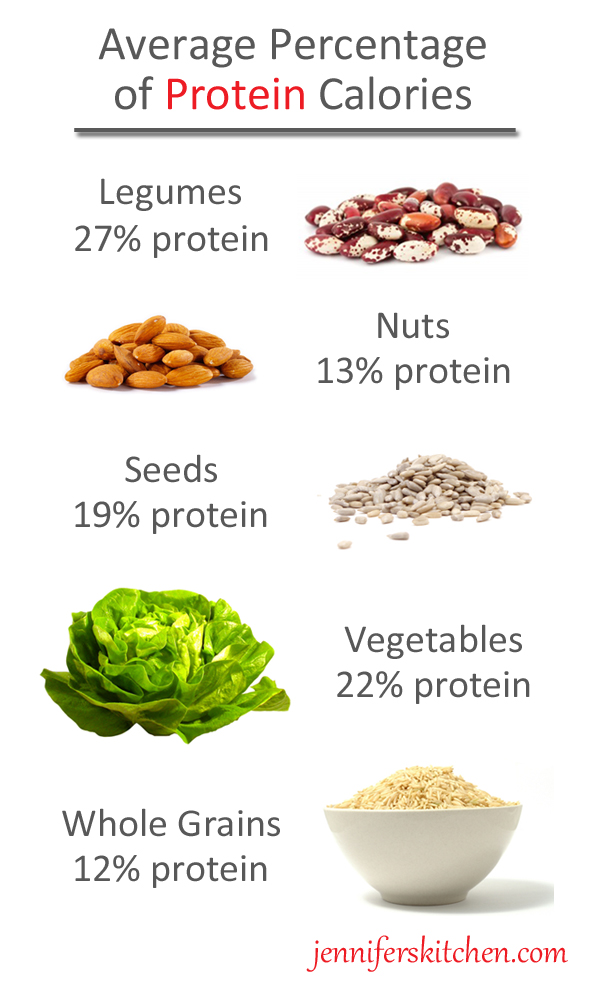
The average level of this nutrient in legumes is 27% of calories, nuts 13% of calories seeds 19%, grains 12%, and vegetables 22%.
Plant foods can easily supply the recommended amount of this nutrient as long as the energy requirements are met.
Protein Combining
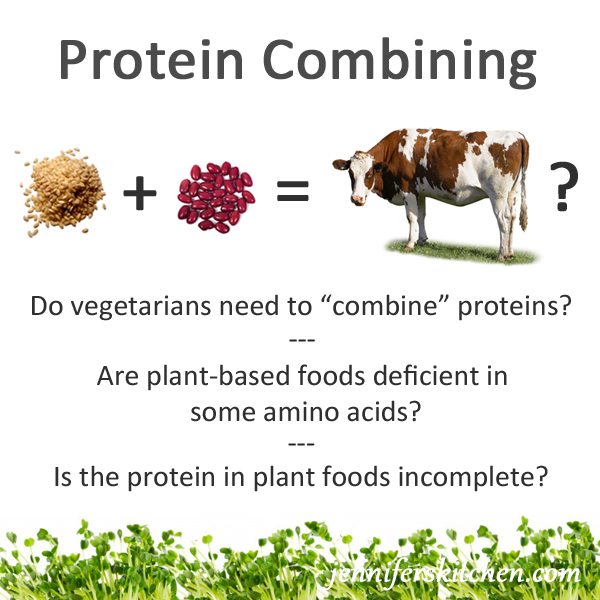
Protein combining (combining certain foods – like beans and rice or bread and peanut butter – to form a complete protein) was a theory from long ago that has been discredited over and over, but has had a hard time saying good-bye.
The “incomplete protein” myth was inadvertently promoted in the 1971 book, Diet for a Small Planet, by Frances Moore Lappe. In this book, the author stated that plant foods do not contain all the essential amino acids; so in order to be healthy, a vegetarian needed to eat a combination of certain plant foods in order to get all of the essential amino acids. It was called the theory of “protein complementing.”
I am quite sure that Frances Moore Lappe did not intend to promote a false theory, and in fact she later retracted her statement and apologized for promoting a myth.
The idea of protein combining became more superstition than science and has been totally refuted.
Do vegetarians have to combine foods to get complete proteins?
All plant based foods, with the exception of most fruit, have varying amounts of this nutrient. Vegetables and grains contain all essential amino acids and non-essential amino acids in varying proportions, and will supply in excess of what is necessary for your daily needs.
Plant proteins are complete.
In addition, the human body stores amino acids for many days, and they can be utilized as needed.
Healthy Sources of Protein
Getting this nutrient from plant sources, like beans, nuts, grains, and vegetables is best. Why? Because these foods come packaged with fiber – which helps fight obesity, diabetes, heart disease, and other diseases.
Also, plant proteins are missing the inflammatory response found in those from animal sources.
I’m an athlete/I work out. Should I increase my protein intake?
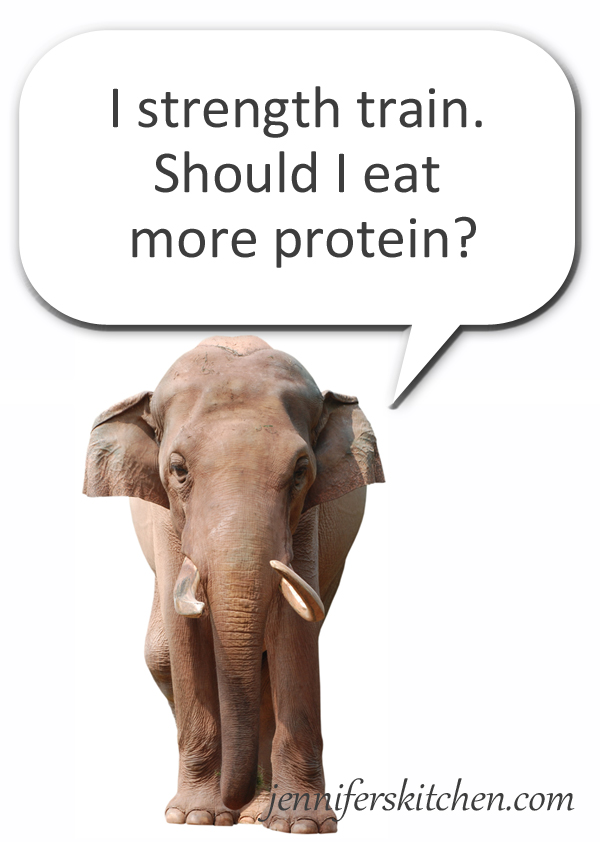
People looking to bulk up sometimes load up on this nutrient, thinking steak, whey shakes, and muscle powders will produce insta-muscles.
But studies show otherwise.
In fact, many studies have found that eating more protein has absolutely NO effect on muscle gain. For example, a study published in the Journal of the International Society of Sports Nutrition stated, “Consuming 5.5 times the recommended daily allowance of protein has no effect on body composition in resistance-trained individuals who otherwise maintain the same training regimen.”
Protein doesn’t build muscles. Exercise does. (The hormones in meat may help a little too, but do you really want to build muscle with zeranol, trenbolone acetate, and progestin melengestrol acetate and increase your risk of disease in the process?).
Carbohydrates are actually the best fuel used to build muscle.
You my also like:
Before you go . . .
Did you know that you can eat all this delicious food AND lose weight? You can!
No calorie counting. No portion sizes.
Join my online weight loss program today!





This is an excellent article. It answered many questions I had about protein. Thank you for the information.
You’re very welcome. I’m glad it was helpful.
Very interesting! I’ve been studying re healthy eating as I’ve been suffering with PMR since 2012 and have to take steroids every day…something I’m trying very hard to stop with a new diet.
Your recipes are very interesting and helpful.
Thanks again
Eileen. In Belfast N.I.
Hi Eileen,
I’m so happy you found it helpful. Too much protein in the diet (as well as too much sugar and refined foods) has been shown to encourage inflammation, so a lower-protein diet may help with PMR. Best wishes to you in your efforts to live healthy. 🙂
Jennifer
This is a fantastic article. Thank you for what you do.
I’m glad you liked it. Thank you for your comment.
Awesome post, very informative and straight to the point.
This article is really an eye opener.. We are Asians and was informed that Asians are very prone to gout due to our genetical makeup. I have been reading a lot of articles regarding the vegan diet and yours reinforces my understanding that it is not so. My husband and I are transitioning to a vegan diet and have noticed marked improvement in our health and the gout issue has been resolved. Thank you for what you do. I will certainly be following your post. Wishing you and your a fantastic Christmas. 🙂
Hi Pauline,
Thank you so much for your comment. I’m glad the article was helpful to you.
I’m happy to hear your gout issue has been resolved. Diet can indeed affect gout. In fact, a study published in Arthritis & Rheumatology (assessing the diets of over 63,000 people) determined that protein from poultry and fish may increase the risk of developing gout. Other research found that purine intake of animal origin increased the odds for recurrent gout attacks by nearly five-fold.
I’m sure you will also experience other benefits from a plant-based diet. I hope you enjoy the recipes on my website.
Wishing you a wonderful Christmas too.
Best,
Jennifer
The concern I have with any information on the internet – especially articles without citations – is credibility of the information cannot be determined. Even with citations, it’s hard to determine credibility without knowing what went into the research (sample size, who funded it, methodology, peer reviews, etc.), but at least the article is one step closer to being credible. I appreciate the information you share on your website; just encourage you to offer citations and.. to do a little research on studies you cite to ensure they are.. credible. btw, I have been a (gluten-free) vegan for many years, so I am fully on board with a plant-based diet.
You make a very good point, Kate. There is so much error being promoted on the internet – how can one know what is true and what is not without citations or some other form of credibility? I will certainly keep this in mind when I am publishing an article. In the meantime, if anyone would like the information for the research/studies I reference here, please feel free to contact me.
Thanks,
Jennifer